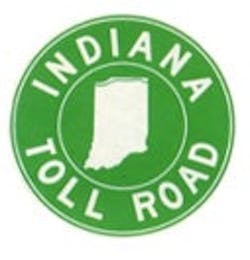Indiana Toll Road lease approved
Indiana lawmakers authorized sweeping changes in the state’s transportation funding system on Tuesday, March 14, when they passed Gov. Mitch Daniels' Major Moves bill on nearly party-line votes in both the House and Senate, the South Bend Tribune reported.
The bill includes a $3.8 billion lease of the Indiana Toll Road to a private, Spanish/Australian consortium that Daniels pitched as the most significant economic-development vote in a generation.
The House passed the measure 51-48; however, no Democrats supported the bill. Only one Republican, Rep. Dave Wolkins (R-Winona Lake), voted no.
Just before the midnight deadline, the Senate passed the measure 31-19.
Administration officials and House GOP leaders worked all day to secure the 51 votes to pass the bill. "I believe history's in the making," bill author Rep. Randy Borror (R-Fort Wayne) said.
House Bill 1008 authorizes Daniels to lease the highway to a foreign investment consortium, which would assume all costs and revenues for 75 years, the South Bend Tribune reported. The same consortium also operates the Chicago Skyway and Canada's 407 toll road around Toronto.
According to the newspaper, the bill also authorizes private construction of I-69 from Evansville to Indianapolis, but it limits tolling authority to its Evansville-to-Martinsville leg unless lawmakers OK tolls all the way to Indianapolis.
The new plan postpones a scheduled fare increase on the Toll Road for passenger vehicles until the private operator installs electronic tolling. At that point—about a year from now, according to the administration—motorists who buy "E-passes" will get 40% fare discounts.
Northern Indiana Republicans pressed the administration for some form of toll relief throughout the session, as one price they needed for their votes, the Tribune reported.
Some of their other demands included significant cash payments to corridor counties and creation of an irrevocable trust that could generate interest over the life of the lease.
House Bill 1008 disperses money around the state, with heavy concentrations in Marion County and the Toll Road corridor. Corridor counties will receive 34% of the net proceeds, after $750 million is subtracted to retire outstanding bonds, pay administrative expenses to secure the lease and establish a $500 million trust fund.
The bill says interest on the trust, but not the principal, can be tapped every five years for transportation projects, the newspaper reported.
The 34% of net proceeds includes all planned state highway projects in the counties, county-by-county distributions of $40 million each and $120 million for the Northwest Indiana Regional Development Authority in Lake and Porter counties. Toll Road counties also will share in a statewide distribution, over two years, of $150 million in motor vehicle highway funds.
Rep. Tim Neese (R-Elkhart) said the plan's details, including the trust fund, secured his vote.
"The alternative is a substantial [gasoline] tax increase" to pay for roads," he said. "It's [also] receiving interest on a large upfront amount of money."
Democrats' opposition turned for months on several issues raised by the bill and its companion lease. This included the length of the lease, foreign operation of an irreplaceable state asset and the operator's right to boost tolls a minimum of 2% per year after 2016, the South Bend Tribune reported.
Public opinion strengthened their resistance, based on constituent communications and an independent, statewide public-opinion poll that showed 60% opposition.
"They know it's a bad deal," Democratic Leader B. Patrick Bauer of South Bend said. "They know we're outsourcing our money and we're tying up something for 75 years and that company's going to make a lot of money."
Democrats insisted that similar economic benefits could be achieved if the state issued bonds, backed by toll revenues, every 20 or 30 years for several bonding cycles, the newspaper reported.
